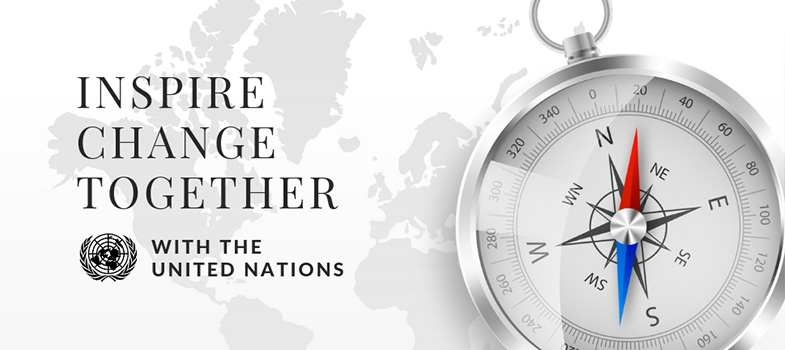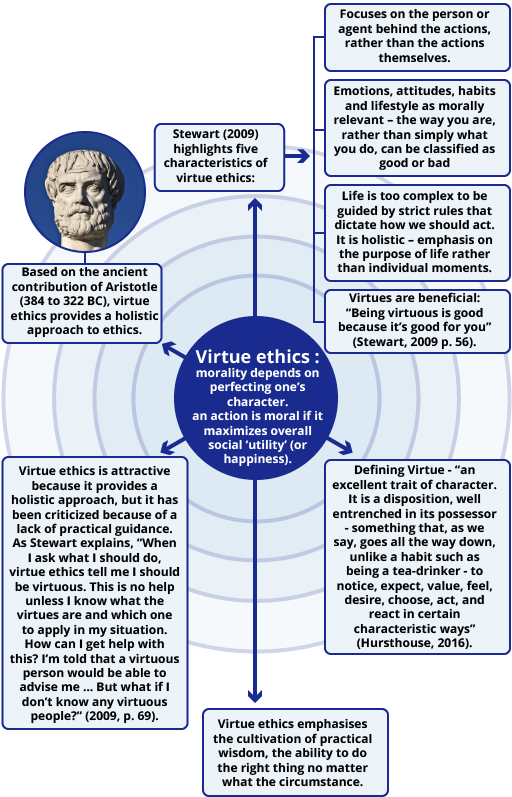5.3 Virtue ethics
In this section you will explore two examples of how the E4J Modules provide teaching activities which seek to develop students’ self-reflection and analysis in relation to the teaching of virtue ethics. Virtue ethics is explained in detail in E4J Ethics Module 1 [Tip: hold Ctrl and click a link to open it in a new tab. (Hide tip)] and is also discussed in relation to the definition of corruption in E4J Anti-Corruption Module 1 , but for clarity, an outline of virtue ethics is given in this video and a summary is provided in the infographic below.
The following two activities illustrate how the E4J materials seek to support students’ self-reflection and analysis in relation to understanding and applying principles of virtue ethics.
Activity 5.3 Role play: The power walk 
This activity is included in E4J Ethics Module 9 (Gender Dimension of Ethics).
This exercise can be used to encourage self-reflection amongst your students. Self-reflection is key to the cultivation of virtuous character traits.
To help your students understand the idea of privilege, and perhaps make them aware of their own privilege, you can ask the students to do the “privilege walk” shown in this short 4-minute video clip. (Here is the Singapore version of the clip.)
How might you avoid causing potential discomfort and embarrassment to your students when using this exercise?
Answer
One way of avoiding causing discomfort and embarrassment to your students, is to use the role-play method and assign fake identities to your students. This is the approach taken by the UN Women Training Centre in its Compendium of Good Practices in Training for Gender Equality (see p. 64). The resource calls refer to the exercise as the “Patriarchy and the Power Walk”.
Identities suggested by UN Women include: male lawyer with private firm, 10-year-old street boy, grandmother taking care of orphans, unemployed single mother, male storekeeper, woman police officer, blind elderly man, male school teacher, female member of parliament, migrant ethnic minority, male literate factory worker, etc.
The UN Women Training Centre provides the following guidance on running the exercise which you may find helpful:
Each student “steps into the shoes” of another person, e.g. a single mother, a blind man, etc.
Statements are read aloud. If these apply to them, they step forward. If not, they do not move.
In the end, participants visually see how much power, access to resources, and opportunities some individuals in society have compared to others.
Based on this, they discuss how power and privilege is relative to a person’s gender, socio-economic position, ethnicity, and other cross-cutting issues. This is followed by a discussion of the “Patriarchal Paradox”, i.e. how men are also disadvantaged by the system of patriarchy.
Statements suggested by UN Women for this exercise include:
I have access to and can read newspapers regularly
I eat at least two nutritious meals a day
I would get legal representation if I am arrested
I would be confident if I had to speak directly to a magistrate
I am not in danger of being sexually harassed or abused
I have a regular income or means of supporting myself
I can speak in meetings of my extended family
I would not be treated violently or roughly if I am arrested
I can afford and access appropriate healthcare
I can question spending of community funds
I can name some of the laws in the country
Someone would immediately be told if I was arrested
I have left over money at the end of the week that I can spend on myself
I can travel anywhere I like without assistance or permission
I do not feel threatened in the workplace by any issues of my identity
I do not feel socially uncomfortable in most situations to voice my opinions
I can do what I like in my home without fear
Other sample statements for this exercise are widely available and we provide two examples below:
If you would like to read more about the subject, open this article on Virtue ethics by philosopher Charles Freeland.
5.2 Self-reflection and analysis

